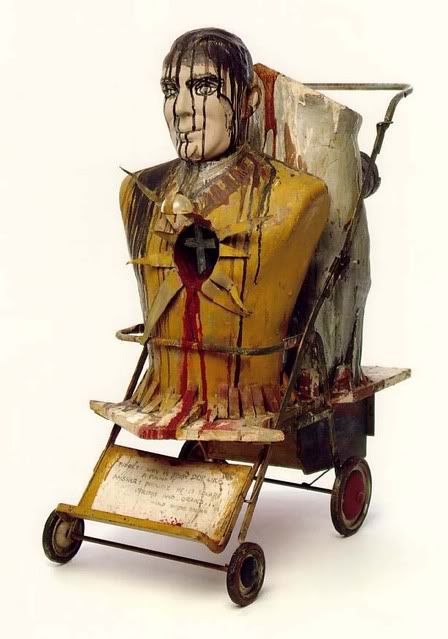The Mixed review is a record of my daily readings. I hope it provides a resource for your own projects and projections into the intricacies of our world.
The 1st Item of the night is: Umberto Eco's Anthropology of the West.(wiki)
Wikipedia reports that in 1988 Uberto Eco founded an organization called Anthropology of the West for the development of anthropological study of "western" society by their "non-western" counter part. This would balance out the advantage that "western" anthropologist gain from their long standing monopoly in defining the "non-western" cultures. Wikipedia reports Eco's prepares in starting the organization as "developed this trans cultural international network based on the idea of Alain Le Pichon in West Africa." This all sounds great except one thing, there is no situation for any of these clam, (check it out for your self). I'm shore it's just an over site but there you have it. I have to say this Anthropology of the West thing sounds pretty rad! It serenely be a phenomenal rescores of diversified knowledge. If anyone knows any more about it they should let me know.
Something else I learned tonight is that Eco has published children's books on the topic of semiotics. Man! it would have been awesome growing up understanding the role that words(signifiers) take in forming meaning through their attachment to ideas(signified) in the mind, and these attachments make up units called signs that form associations and meaning through their differences. I guess one of these books the Bomb and the General is about the escape attempts of a group of atoms that were imprisoned by a diabolical military general, the general confide the atoms in nuclear war heads in his Attic.
Here's the link: http://umbertoeco.com/en/childrens-books.html
The 2st Item of the night is: Chapter 14 "Money" in Understanding media by Marshall Mcluhan.
For Mcluhan money shares one nature with everything that is its a medium that both communicates, and that that communication is never neutral. Understanding media states "'money talks" because money is a metaphor, a transfer, and a bridge. Like words and language, money is a storehouse of communally achieved work, skill, and experience. Money, however, is also a specialist technology like writing; and as the clock visually separates time from space, so money separates work from the other social functions. Even today money is a language for translating the work of the farmer into the work of the barber, Doctor, engineer, plumber. As a vast social metaphor, bridge, or translator, money-like writing-speeds up exchange and tightens the bonds of interdependence in any community. It gives great spatial extension and control to political organizations, just as writing does, or the calendar. It is action at a distance, both in space and in time. In a highly literate, fragmented society, "Time is money," and money is the store of other people's time and effect." Money separates in that it crates the devotion of labor or makes so activities more "worthy" of its benefits while leaving other activities to those that want to wast time, and on the other hand draws divergent tasks into one economy or "storehouse" of "communally achieved work, skill, and experience.
Understanding media also presents two main types of money: commodity, and currency.
According to this writer, commodity economies are the older of the two. Some of the examples of commodities given are whales’' teeth on the island of Fiji and rats on Easter Island. The writer sites circumstances where "literate" cultures go back to commodity economies; "The Dutch, after the German occupation of World War II, were avid for tobacco."
Understanding Media clams that "money always retains something of its commodity and community character." The writer clams that voluntary release in children comes whith their development of speech and he then relates this to the currency economies lose grasp on commodities in favor of currency exchange.
"Currency is a way of letting go of the immediate staples and commodities that first serve as money, in order to extend trading to the whole social complex." He relates the speed of currency to the development of the phonetic alphabet. "money, like writing, has the power to specialize and to rechanneled human energies and to separate functions, just as it translates and reduces one kind of work to another. Even in the electronic age it has lost none of this power."
"The use of a commodity such as money naturally increases its production." Vergina around the time of the revolution made "European currencies quite dispensable," Presumably by over printing or maybe by refusing it as a means of paying taxes. As a response to the monitory debasement the Virginians legislated tobacco as legal tender which in turn lead to an increase in tobacco production.
Smuel Butler relates the "faith" required to maintain a paper currency to a religious sacrament, and even canonizing wealth as sainthood in this new religion of "prosperity." - a look glimpse forward to the future prosperity gospel of our modern times.
The thing that I think McLuhan overlooks in all this is the degree to which even a currency economy depends on the value of fungible commodities for its stability and health. That indeed even in currency economy fungible commodities like crude oil make up the majority of economic transaction, and when a exchange value of a commodity out passes its use value then we get financial bubbles. What I'm saying is that to the degree to which an economy is based on the pure exchange of currency this economie's commody market will be over inflated.
The 3ed itum of the night is: The art of Joan Miró & Ed Kienholz.
I'm going rename the paintings what I want to because it looks like a rorschach.
Even natural things are gettin' into the evil pollution mad house since the epic gen jam last Monday!!!
This one's Ed Kienholz
It rains on the just and unjust alike.



No comments:
Post a Comment